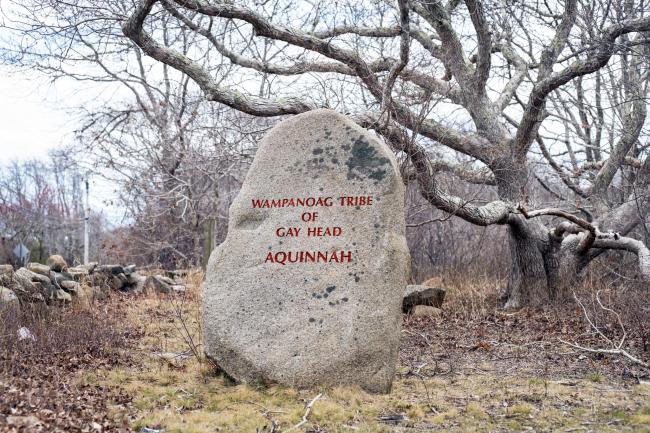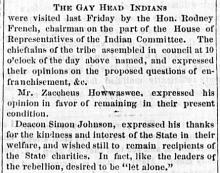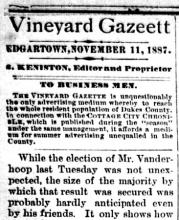The federal government Wednesday recognized the tribal status of the Gay Head Wampanoag Indians in a historic decision that opens the way to settlement of the bitter, 12-year-old land claim dispute.
In a surprising policy shift that broke with precedent, the Bureau of Indian Affairs in the U.S. Interior Department reversed and earlier position and threw its support to tribal recognition for the Gay Head Wampanoags. It was the first such reversal since the national Indian recognition issue came before the federal government.
The ruling declares:
“It has been found that the new evidence, when considered in light of the arguments and observations presented by other interested parties and a reconsideration of factual data in the proposed finding shifts the determination in favor of the petitioner and, therefore, warrants amending the preliminary decision that the Wampanoag Tribal Council of Gay Head does not meet tow of the criteria set forth....
“However, the favorable determination in light of the new evidence was similarly difficult to decide and this decision remains commensurably close.”
The six-page notice of final determination for federal acknowledgement, attached to a 13-page, single-spaced report on the evidence, was prepared by the branch of acknowledgement and research in the Bureau of Indian affairs. The rulings is signed by Ross O. Swimmer, assistant secretary for Indian affairs.
“This is what we've been shooting for. It's finally here. There has never been any doubt in our minds that we are a tribe,” said Gladys Widdis, president of the Wampanoag Tribal Council, Inc.
“It's never been front page. It has been a gut feeling but it's been in everybody;s mind. There has always been a wish. It is more pronounced individually. Each person has his own reasons and there was always the desire.”
Rep. Gerry E. Studds and Sen. Edward M. Kennedy said they will reintroduce legislation, the last step of settlement in the land claim suit, on the floor of the U.S. Congress in two to three weeks. They are uncertain if hearings will be required by the responsible congressional committees.
Different versions of an amended bill to settle the land claim suit were passed by both the House and the Senate late in the last session of Congress, but were stalled when controversial and unrelated amendments were attached.
Senator Kennedy said: “This really clears the way for legislation. A few things that have to be worked out concern the purchase price of the land. The important thing is the strong state commitment to half the price. We'll just have to work that out. There seems to be a strong commitment to move ahead.
“We all have to realize there are scarce resources in this budget. I think there's no question this makes a lot more sense than spending $40 million down to Nicaragua.
“All of us on the Vineyard, as well in Massachusetts and Cape Cod, recognize there have been situations that have been unresolved and unsettled. Unresolved and unsettled provides for an unsure future. For people in this instance, the certainty will result and I believe a longstanding responsibility will be removed. The principle is important. The final chapter hasn't been written but I hope the final one is a positive one.”
Of the decision Mr. Studds said: “I think it's a tribute in part to the hard work of the town and the tribe and their attorneys, as well as those who worked and spoke for them.
“And I guess one has to say that it is a tribute to the ability of some people in this administration to conduct themselves as professionals and make judgements on facts rather than solely with green eyeshades on or ideological blinders on. As far as I can tell, the Interior Department made its best judgements, made it on the merits of the case as they saw it. One cannot ask more than that from public servants.
“I suspect the Office of Management and Budget would have had its druthers otherwise. I'm delighted. I caution that we're not home free. There's always a risk. Now it's a question of the good faith of the administration.”
The federal Office of Management and Budget (OMB) last year stated three conditions needed for settlement of the prolonged land claim dispute. It demanded the state provide on half, or $1.5 million of the settlement cost, that the Gay Head tribe prove the validity of its claim; that formal tribal recognition was essential State approval of the $1.5 million support in Janurary 1986.
The favorable decision clears the way for swift reintroduction of the bill, Mr. Studds said. “Clearly, OMB is on record as of lay year saying that if these steps were taken that they would not oppose the bill. It is an enormous and esstianl step in the right direction.”
Federally recognized Indian tribes qulify for government monies in housing, health care, economic development and emploment. As part of the sttelment agreement, the federally recognized Gay Head Indians will claim ownership of 238 acres of town Common Lands. Through a $3 million fund, the tribe can purchase 175 acres of privately held land and support a housing and economic development fund.
'Mrs. Widdiss said: “We worked for it. We wouldn't take no for an answer. We could have said, four or six years ago, 'forget it.' That would have been the easy way out. We wouldn't take it lying down. It's that determination on our part that has brought it to conclusion. It could possibly have gone the other way.
“Speaking personally, we don't go around with signs on us. We know who we are. We know where we are coming from and hopefully we know where we're going, as much as anyone can today.”
In Gay Head, tribal spokesmen and members of the Gay Head Taxpayers Association echoed her optimistic reaction. Others were more cautious.
Jeffrey Madison, chairman of the board of selectmen, said: “On face value, it looks real good. It's one step in the right direction, but that doesn't guarantee a settlement of the problem. The property has increased in value. Does that five the government an out to say that now it is too expensive?”
Robert Stutz of the taxpayers association said. “It may very well clear the way for the settlement we've worked so hard to accomplish. It may be the beginning of the end, but it has been blown hot and cold before.”
James L. Quarles 3rd, attorney for the taxpayers, said the association may appeal the decision if it decides to dispute the recognition ruling.
“Obviously, we've just gotten the decision and we're in the process of reviewing it. Tribal recognition has always been a condition of the settlement by which we stand. And so, at the same time, we're beginning to rejuvenate the vill we pursued while this was pending,” Mr. Quarles said.
Wampanoag Chief Donald Malson and Medicine Man Luther Madison declined comment until the tribal council holds a meeting. The session is scheduled for Wednesday, Feb. 11 in Gay Head.
Henry Sockbeson, attorney for the Native American Rights Fund which represents the tribe, will come to the Island to explain the decision before the tribal meeting.
Dissident trbal members who have opposed terms of the settlement repeated past positions. Some said they wished to study the results of the decision before commenting. Others could not be reached for comment.
Robert C. Hahn, attorney for the dissident members, said: “It's not a benefit to the tribe. The Gay Head Wampanoags are going to end up very much behind the eight ball. The settlement is about a complete a sell out of Indians as it can be.”
Mr. Sockbeson, attorney for the Gay Head Indians, said: “Frankly, I think the Bureu of Indian Affiars deserves a lot of credit for saying they were initially incorrect and that basd on additional findings the Wampanoags are a tribe, given the political climate of the day, I think the administration will be neutral and President Reagan will sign the bill.”
Mr. Stockbeson also addressed the tone of the final decision, which was critical of the petitioners because it claims they did not supply the information as requested.
“The petitioner's response provided a considerable amount of additional information and documentation. Had this supporting evidence been supplied when it was requested, a postive proposed finding more likely would have resulted,” the staff report states.
Mr. Stockbeson said: “They had two alternatives, blaming themselves or blaming us. The simple fact they reversed themselves proves to me the additional amount of work was not that substantial at all.”
Two of seven criteria that the Wampanoags supplied additional evidence fro to gain them federal tribal status were in the areas of social cohesion and political influence and authority.
“It was a close call,” said Michael Lawson at the Interior Department. Mr. Lawson, who is in chare of the staff recommendation, said the tribe was sucessful in provideding enough evidence to challenge the initial conclusions.
“There were lines of communication that we as the evaluators were not aware of, based on our own field research, limited as it was,” he said.
The final report states:
“The petitioner also supplied additional information about the tribe's social interaction during important tribal occasions such as birthday, weddings, retirements and funerals. The proposed finding concluded that group interaction at these times was minimal, but the new evidence submitted demonstrates that this was not the case.
“These data show that the Gay Head Wampanoags have an extensive and interrelated communication network connecting those Wampanoags in Gay Head and elsewhere on Martha's Vineyard with each other and with those members living off-Island. Included in this metwork are the major families of the tribe and the tribal officers. Some of the tribal officers are Gay Head town officials.”
The second area, that of proving a continued tribal influence or other authority of members as an autonomous entity until present, gave the bureau the opportuity to credit five Gay Head Indians with leadership power over the members.
“The picture that emerges from the rebuttal evidence and arguments and from a reconsideration of the evidence in the proposed finding is of a tribal political situation which is considerably more fluid and diffused than that which was initially described.
“The available evidence shows that the Gay Head Wampanoags adapted the principal elements of the town governmental system which was imposed upon them by the commonwealth of Massachusetts ad that, within the limits possible, the town government served as the primary structure by which the tribe maintained political influence and or authority over both its resident and non-resident members.
“Further evidence presented in the petitioner's rebuttal demonstrated that political influence or other authority was also maintained over members through organizational bodiess which functioned outside of and or parallel to the otwn government such as the Howwaswee and Pawkunnawakutt Councils and the Wampanoag Tribal Council of Gay Head, and by leaders such as Harrison Vanderhoop, Lorenzo Jeffers, Napolean Madison and Donald Malonson, who have functioned both outside and within the municipal structure of the town of Gay Head.”
The report also names Walter Jennings.
Mr. Lawson explained that in many of the 20 petitions the bureau accepted, additional evidence to revers the initial finding is never submitted.
In the case of Gay Head, he said, letters from member of the Vineyard as well as the scholarly community had much impact on the reversal of the decision. Records of Gay Head life recorded over the years through social columns and news stories in past editions of the Vineyard Gazette also figured in the government's ruling, he said.









Comments